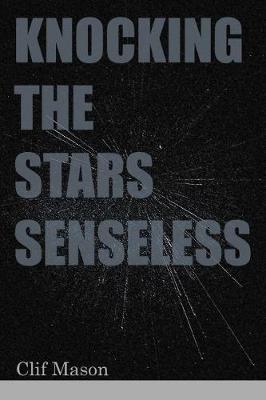Part II
This recurring theme [that beauty can enlighten tragedy] returns
in “Ghost Music” as it deals with the speaker’s loss of his father: “The
singing tongue is cut from autumn’s river.” In essence, Mason’s speaker asks us
in his songs: How can we keep singing
when the world is full of pain? The answer comes, through much pain, at the
poem’s end:
Wind picks his pocket again as he
ambles.
It steals again sweat from his
body, music from his ears.
It takes again the gait from his
legs, the taste from his tongue.
The more it steals, the less he
feels bound by gravity.
He laughs as the wind bears him off
like a kite.
 When I critiqued his poems, I often slammed Mason’s use of
“stars” in his poetry as I’d seen too many awful poems written with that in
them, but through judicious use and careful building of his motif, he’s made
the stars his own. It is in the book title and the titular poem, after all. And
it’s cleverly deployed, to boot. The stars could be incandescent dots that
candle the night, or those whom society reveres, for whatever reason, or the
heavenly afterlife (“to drink from the stars’ chalice / the black anodyne of
sleep.”—“Fugue for the Sandy Hook Dead” or in “I Wore the Night Like a
Roquelaure” where when a grandmother passes, the speaker’s song becomes “the
new star of resolve / in her brain’s core.” That last poem, especially at its
titular moment, seems to be the transformation of the speaker who turns grief
into something transcendent.). And “senseless” could be unconscious or a lack
of meaning. All of these senses fuel Mason’s poetry. (Am I eating crow? Very well, I eat crow.)
When I critiqued his poems, I often slammed Mason’s use of
“stars” in his poetry as I’d seen too many awful poems written with that in
them, but through judicious use and careful building of his motif, he’s made
the stars his own. It is in the book title and the titular poem, after all. And
it’s cleverly deployed, to boot. The stars could be incandescent dots that
candle the night, or those whom society reveres, for whatever reason, or the
heavenly afterlife (“to drink from the stars’ chalice / the black anodyne of
sleep.”—“Fugue for the Sandy Hook Dead” or in “I Wore the Night Like a
Roquelaure” where when a grandmother passes, the speaker’s song becomes “the
new star of resolve / in her brain’s core.” That last poem, especially at its
titular moment, seems to be the transformation of the speaker who turns grief
into something transcendent.). And “senseless” could be unconscious or a lack
of meaning. All of these senses fuel Mason’s poetry. (Am I eating crow? Very well, I eat crow.)
In “The Sea Anemone Must Wed Lightning” Mason writes of
suffering as a thing we carry, perhaps belongings we should value:
What can I say of this suffering,
except that it is mine? I will
carry it
into autumn, holding it over
my head as, crossing a river,
I would a bundle of clothes.
Later, the speaker sings what he wants songs to do:
I want the song that will lift
the moon’s white bone back
into its black socket. I want the
song....
that will raise a fallen
child, if only for a day
The final poem, “Thanksgiving Song,” refines this idea of
song (brought up in “I Wore the Night Like a Roquelaure” – discussed above) as
the magic that words carry in them and the magic that we carry within us:
I can sing with the broken bone
of the yellow half-moon....
Each name sings
light needles into ebony dusk....
we are all
yes, each & every one, the last
least, best unexpected thing.
This poem—with a few rivals for being the best in the book—deserves
to be anthologized in a dozen or two good anthologies. Poet Patrick Hicks also
singled out this poem. Forgive the excerpt as only the whole poem can do it
justice.
Judith Sornberger writes that his work is “Incantatory as
Whitman” which you’ll find in a poem like “Depression”:
All the harvesters are falling
apart, shaking & shuddering
& collapsing before they can
leave the fields.
All the luxury automobiles are
falling apart
in garages & shops & on the
street
All the bridges & skyscrapers
are falling apart
falling to rust & poisonous
dust & bent & sheered rebar.
These excerpts and examinations should more than adequately
suggest why you should acquire this book for yourself (or get your library to
do so, if you cannot afford it).
What makes these poems stand out above most contemporary
poetry: His poems tell you why you should read them. The images and sounds—even
interesting philosophic content—suck the reader in. Not the particular
political stance as if poetry were more about politics than aesthetics
(although, yes, Mason toes the line of the politically correct), not the surreal
inscrutability (although, yes, Mason uses some of that), not a bolus of images that
are hard to swallow (although, yes, Mason’s imagery astounds and confounds),
but he uses his silvery tongue to get us to leap after, to travel to this
strange land we tread upon and intriguing scenarios, or some other spark of interest
to keep us reading and rereading.
For example, “Darkfall” opens with intrigue and mystery:
For centuries we seeded the cemeteries
so it was no surprise the soil
grew nothing but headstones.
How can those lines not get one to read on? This is part of what
makes this book rise above its peers. If poets and poetry readers aren’t flocking
to this book this year, then there’s too little justice in the world, but at
least it exists and we the lucky, who have read it, can lift it over our heads
as if crossing a river and call on others to hear these songs.

No comments:
Post a Comment